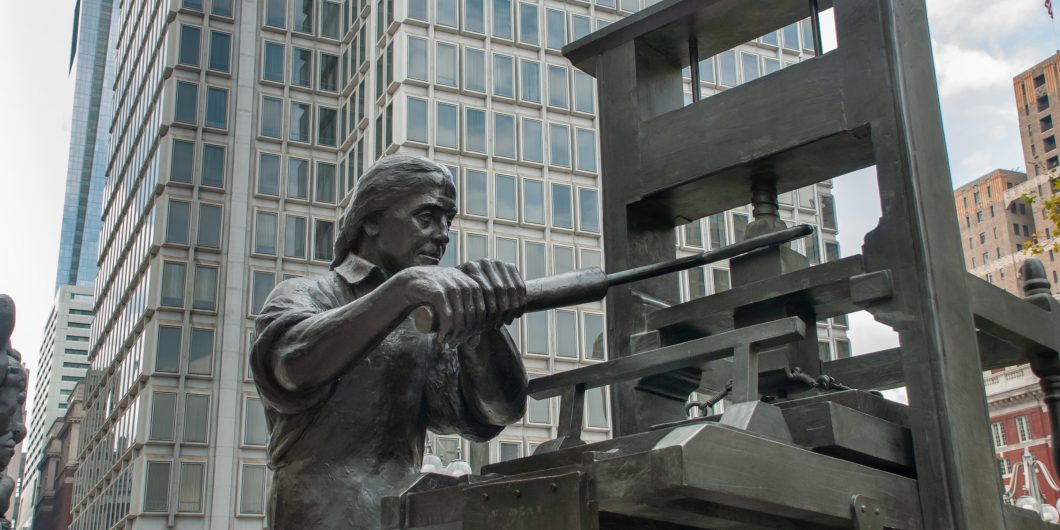Good sense and a dash of humility might go a long way.
Poor Richard's Rules for Big Tech
What to do about social media? In some ways, the question is unprecedented. Social media are new, and therefore the case is new. Yet it might not be so new as some think. In fact, a passage in Benjamin Franklin’s Autobiography might shed some light on the issue of how to balance the competing imperatives of the liberty of the press and the rights of publishers.
Benjamin Franklin’s Printing Press
Toward the end of Part II of the Autobiography, Franklin discusses his understanding of his rights and responsibilities as both the owner of a printing press and the publisher of a newspaper:
In the conduct of my newspaper, I carefully excluded all libelling and personal abuse, which is of late years become so disgraceful to our country. Whenever I was solicited to insert anything of that kind, and the writers pleaded, as they generally did, the liberty of the press, and that a newspaper was like a stage-coach, in which any one who would pay had a right to a place, my answer was, that I would print the piece separately if desired, and the author might have as many copies as he pleased to distribute himself, but that I would not take upon me to spread his detraction; and that, having contracted with my subscribers to furnish them with what might be either useful or entertaining, I could not fill their papers with private altercation, in which they had no concern, without doing them manifest injustice.
Note the distinction Franklin made, and the argument to which he was responding. Franklin separated the responsibility he had as the owner of a printing press and his responsibility as the publisher of The Pennsylvania Gazette. Meanwhile, on the other side, people demanding Franklin publish something made a “liberty of the press” claim, and analogized the newspaper to a “stage-coach, in which any one who would pay had a right to a place.”
Franklin rejected the argument that the publisher of a newspaper had no right to choose what to publish, even if the customer was willing to pay for publication. As a publisher, he had responsibilities to the readers of the paper who had a certain expectation about the kinds of material that would and would not be in his paper. It is probably worth mentioning that Franklin also had a fairly broad conception of what was an acceptable line of public discussion. He did not object to arguments about controversial subjects of the day. Franklin was, after all, a practicing scientist, and understood that scientific progress is often made by folks who challenge a currently prevailing scientific consensus. Franklin was also an acute polemicist. He enjoyed robust argument. His objection was to slanderous or libelous writing.
But note that Franklin accepted the argument that the owner of a printing press had an obligation to publish even materials that he thought represented an abuse of the press, however separately from his newspaper, if asked. Presumably, he recognized some limits: He probably would have refused to publish a challenge to duel or brawl, and he probably drew the line at pornography. But nevertheless, he accepted the analogy between a printing press and a stagecoach. That analogy is very much in the news lately.
Common Law Principles
Where does this story get us on the question of the rights and obligations of major social media platforms such as Facebook and Twitter to publish? Common law was, as a rule, the point of departure of American property law. (Jefferson’s attack on entail in Virginia immediately after penning the Declaration is an example of a significant change from English precedent. But such changes were the exception.) And under common law one had a general right to use one’s property at discretion, serving or not serving customers as one chose. The reason why taxation without representation was wrong followed the same logic, incidentally. The government did not have a presumptive right to take whatever it needed for what the King deemed to be the common good. On the contrary, the people decided how much the King’s government would have each year to use.
Even though the general rule was that one had discretion in the use of one’s property, there were exceptions. Certain businesses were understood to be both essential and monopolistic—like a stagecoach. Why was a stagecoach different? Because the kind of business the stagecoach did was unique and essential. Arbitrarily to deprive individuals of use of the stagecoach was arbitrarily to deprive them of the liberty to travel. Sure, they could walk or hire a horse, but those were high burdens. Turning to Franklin’s business as printer, he could tell others that they were free to buy paper and handwrite many copies, but he recognized that would be an unreasonable request. In other words, there are some businesses that become, due to their scope and nature, public, or at least quasi-public.
Mark Zuckerberg’s and Jack Dorsey’s censorship reveals the decline, among an influential swath of elite American public opinion, of belief in free, open, and public discussion of contentious issues.
Modern American law, particularly civil rights law, has obscured this aspect of the law. Our civil rights law treats just about all businesses as common carriers or as “public accommodations,” a parallel classification, when it comes to the categories it protects. Nowadays, government regulates the cases in which the owner of a small private social hall has the right to decide whom to serve. The owners have no general right to decide who may hire their hall. (Formerly, a venue so large as Madison Square Garden might have had that obligation, but not a small venue). Moreover, our law regulates not only who is served under what conditions, but it also regulates the internal operations of the business involving hiring and firing, something outside the scope of the old common carrier rules. From that perspective, the general right to use one’s property as one sees fit is much attenuated.
These changes have turned us away from the underlying logic of the old rules—there is a general discretion in the use of one’s property, including the right to decide whom to serve and whom to hire, but there are limits to that right that fall upon some essential, monopolistic businesses. In those rare cases, the public aspect of the business was classically understood to be so significant that private rights are diminished. Hence the Supreme Court in the 1920s rejected a New York State regulation of the price of theater tickets charged by scalpers because there is no general need to have an affordable theater ticket. (By contrast, the Court might have allowed for limits on the discretion that the owner of a large theater had in deciding who may purchase a ticket at the going price). Note the way that the logic of the law connected with the kinds of exceptions to property rights that were and were not acceptable.
The Big Tech Crisis
What might this imply for our big social media platforms? Are they more like Franklin’s printing press than they are like his newspaper? In a recent interview with the Wall Street Journal, Richard Epstein, a man noted for his general bias toward the market and against regulation, discussed this idea. A small online forum or list-serve clearly ought to be as open or closed as the folks running it wish it to be. But in cyberspace, a few platforms have grown so large that they are now quasi-public. It might be the case that these few should be classed as common carriers. If that is the case, then the default position with regard to how they are regulated reverses polarity. Facebook, Twitter, and perhaps one or two others, have created what is now essential, public space in which political discussion, the lifeblood of deliberative democracy, takes place.
As deliberative democracy implies that the public is engaged in a freewheeling, open discussion of the issues, it is important to ensure that the discussion truly is free in our public spaces, reflecting American public opinion as a whole. That being the case, the bias in regulation ought to be toward ensuring free and open discussion in these fora. To be sure, there is still room for limits. Presumably, stagecoaches could kick off passengers who displayed particularly bad behavior. But “bad behavior” would have to have the kind of rules and limitations that Franklin applied to his printing press, and not those he applied to his newspaper, or the rules would be arbitrary, given the public scope of the few fora in question.
Does the analogy apply to social media? Franklin was the publisher of his newspaper. As such, he was directly responsible for the content of the paper in a way that discussion platform operators are not. One might argue that their business is providing a space in which customers enjoy the conversation, cat videos, and so forth, making it more like Franklin’s newspaper. Hence the business model of any given social media platform might even require them to decide who to include and who to exclude. Some want to talk only with people on the Left. Others might want to talk only with people on the Right, etc. This competition would resemble the newspapers of the 19th century when partisan bias was a norm in the news business. But can that argument suit the largest platforms? Maybe and maybe not. Epstein is not wrong to be unsure at this point in time. The assumption that the current dominant position of Facebook and Twitter is not going to change might very well be mistaken.
The initial creation and success of Parler might suggest that the barriers to entry are not so high as to justify such regulation. But recall that Parler was shut down when Amazon killed access to its servers. And Apple booted Parler from its app store. Eventually, Parler found other servers, but it took a while, and only after it changed the way it policed content.
And that might suggest that the common carrier issue, if there is one, lies here. In kicking Parler off its servers and app store, Amazon and Apple were doing what Franklin thought crossed the line. What was done to shut down Parler was the equivalent of telling someone to find another printer to publish their piece back in an age when printing presses were scarce. In other words, it might be that the place where the stagecoach/printing press analogy would apply is at the level of the networks and servers—Verizon and the others must allow access, as must the major server farmers in order to allow the kind of free and open discussion that deliberative democracy requires. Meanwhile, Mark Zuckerberg’s and Jack Dorsey’s censorship reveals the decline, among an influential swath of elite American public opinion, of belief in free, open, and public discussion of contentious issues. But the problem of such decline might be a separate issue from the merits of treating social media platforms as common carriers.
It will take a close policy analysis to find out how the many moving pieces ought to fit together. But it doesn’t hurt to start with the broad principles that Franklin expressed: We have a general right to use our own property in the way we see fit, but the public also has a right to access essential services. It is the role of prudential judgment to decide how best to balance these dynamic principles of freedom and responsibility.


